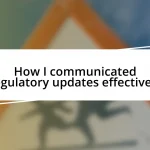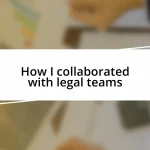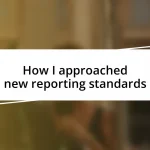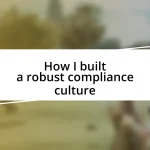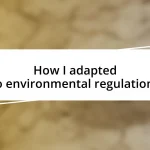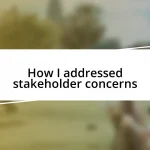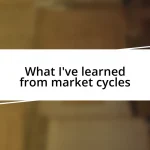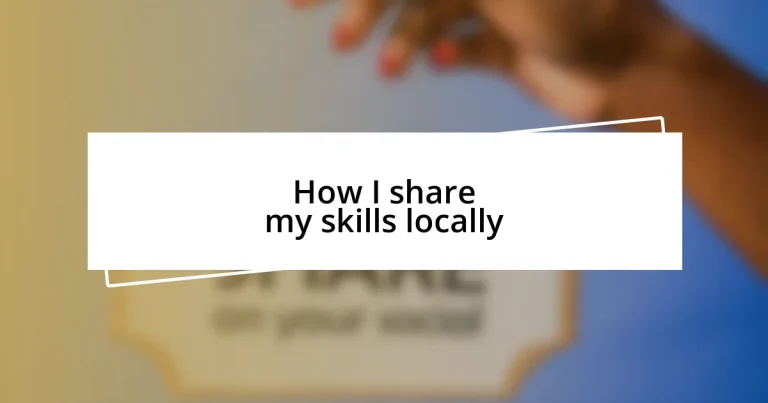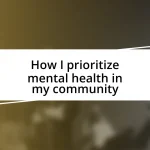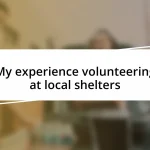Key takeaways:
- Identifying local skills involves recognizing unique talents in the community, addressing current needs, and leveraging personal passions to inspire others.
- Building a community network through organized skill-sharing events, social media groups, and collaborations enhances participation and resource availability.
- Gathering feedback after workshops and engaging with participants post-event fosters improvement, deeper connections, and encourages community dialogue.
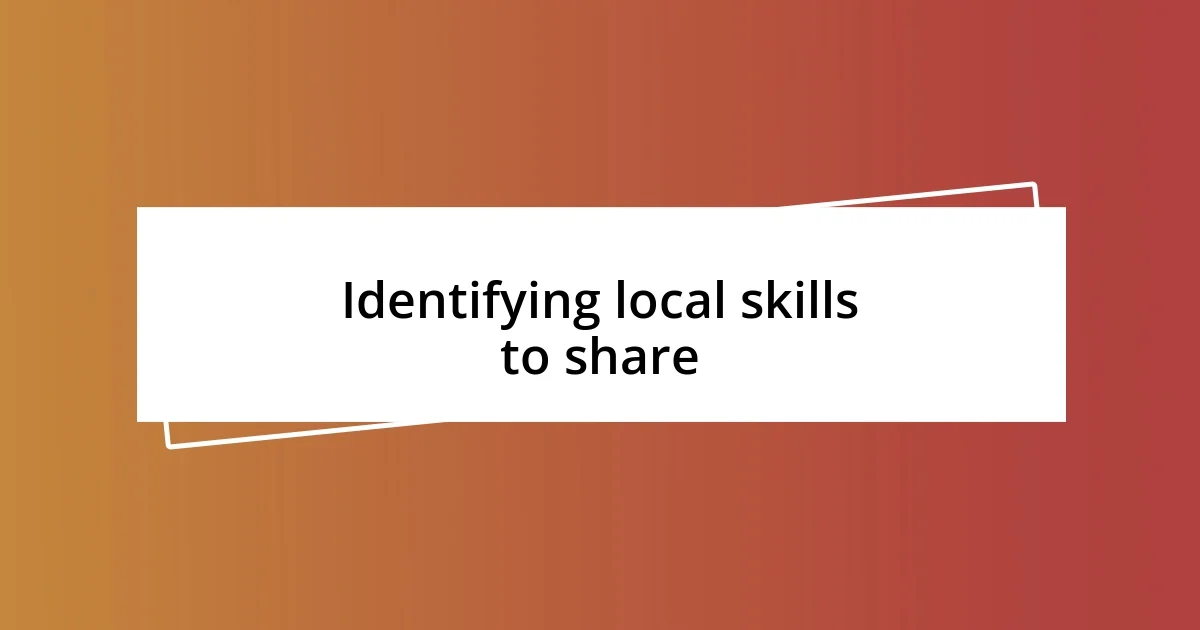
Identifying local skills to share
Identifying local skills to share starts with understanding the unique talents and knowledge present within your community. For instance, I realized that my neighbor, an elderly gentleman, had an incredible talent for woodworking that he had honed over decades but never had a chance to share. Have you ever noticed hidden skills right around you that just need a little encouragement to surface?
It’s also vital to consider the current needs in your community. When I started volunteering at a local food bank, I discovered that many people were eager to learn basic cooking skills. This collective interest sparked a wonderful series of cooking workshops that not only shared knowledge but also brought people together in a warm, supportive environment. Have you thought about the gaps where your skills could meet the needs of others?
Finally, don’t overlook your own passions. I’m passionate about photography, and I found that offering free photography classes in a local park drew in participants eager to learn. This experience encouraged me to think about how my hobbies can also serve those around me. How about you? What skills light a fire in you that might inspire others to learn?
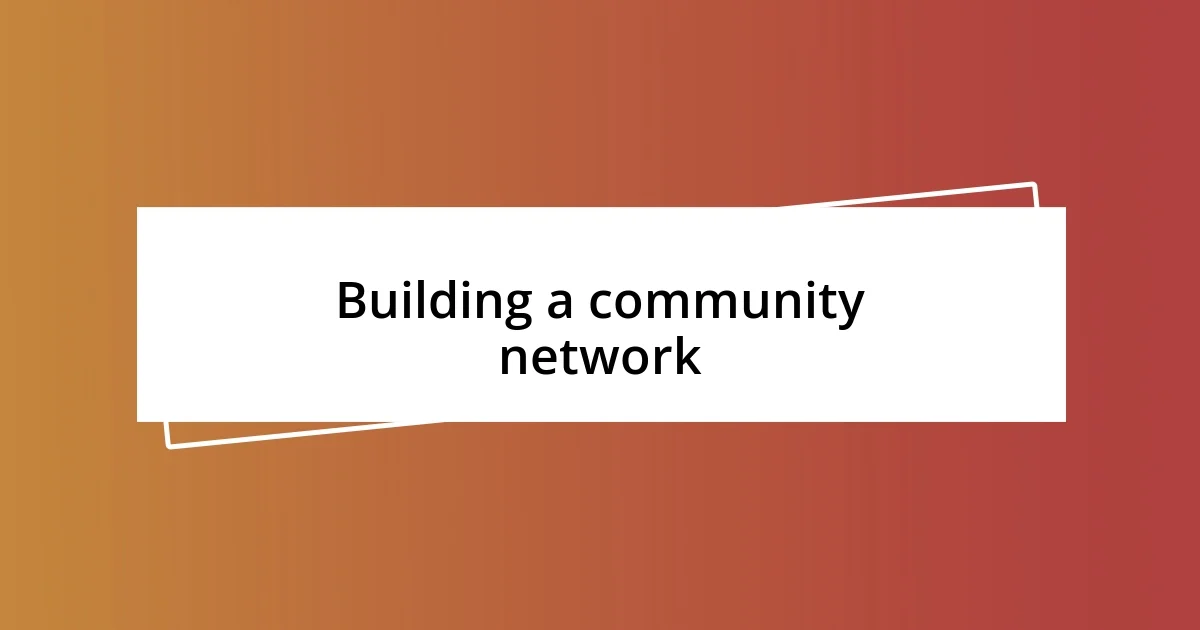
Building a community network
Building a strong community network is all about connection. I remember the first time I organized a neighborhood meet-up focused on skill-sharing; it felt electric. People came with different backgrounds and expertise, and witnessing their excitement to share was truly inspiring. It reminded me that when we pool our talents, we create a tapestry of knowledge that’s far richer than what any of us could offer alone.
To help you cultivate your own community network, here are some actionable steps:
- Host skill-sharing events where everyone can showcase their talents, like art classes or gardening workshops.
- Create social media groups specifically for your community to exchange ideas and promote upcoming events.
- Collaborate with local organizations to reach a wider audience and enhance your events with additional resources.
- Encourage interpersonal connections by setting up mentorship programs that pair knowledgeable locals with those eager to learn.
- Celebrate successes together, whether it’s through local newsletters or community boards, to keep morale high and show progress.
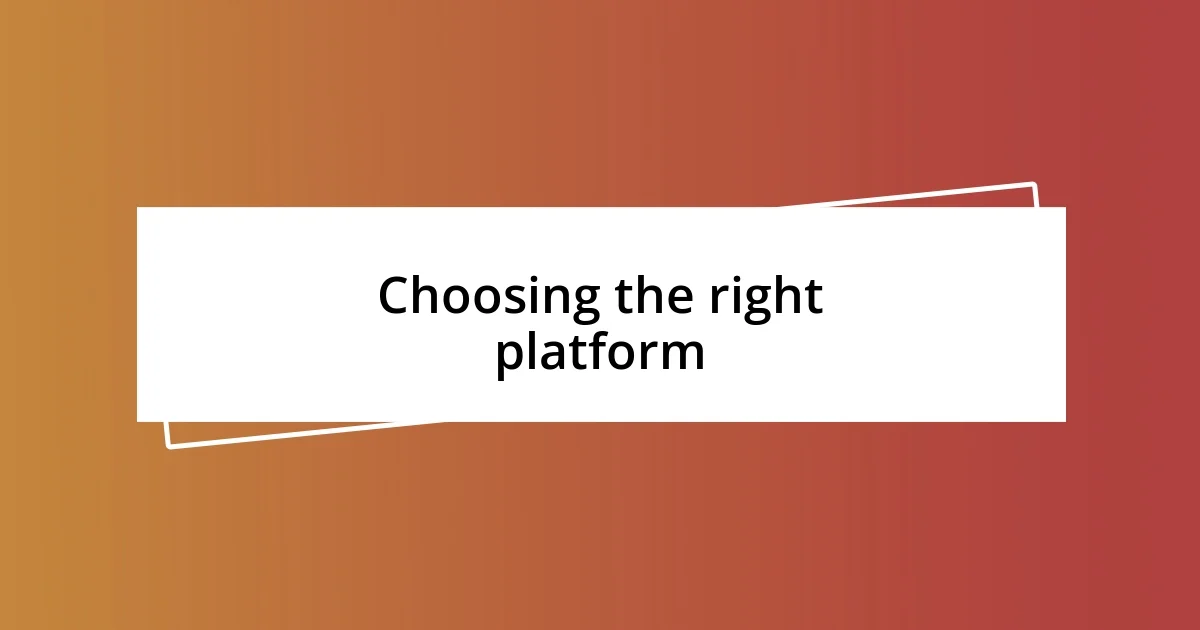
Choosing the right platform
When it comes to choosing the right platform for sharing your skills locally, consider where your audience is likely to congregate. I still remember the first time I posted a free yoga class on a local community board. The response was overwhelming; I never expected to welcome such a diverse group of eager individuals. Understanding which platform resonates with people in your area can make all the difference.
Another factor to weigh is the type of engagement you seek. While social media platforms like Facebook bring visibility, I’ve found that in-person events foster a more personal connection. For example, when I decided to host my photography workshops in a local cafe, the intimate atmosphere allowed for deeper conversations and a genuine exchange of ideas. Reflect on what kind of interaction you want to create – sometimes, a more personal touch can leave a lasting impression.
Finally, don’t shy away from experimenting with different platforms. I initially used a community bulletin for my cooking classes, but then transitioned to Meetup. The flexibility helped me reach more participants and offered valuable feedback. Have you thought about trying out multiple platforms until you find the one that feels right for your skills?
| Platform | Pros |
|---|---|
| Community Boards | Local reach; easy to connect personally |
| Facebook Groups | Larger audience; good for sharing events |
| Meetup | Designed for events; fosters engagement |
| Social Media (Instagram) | Visual appeal; great for creative skills |
| Local Cafes/Studios | Intimate setting; promotes face-to-face interaction |
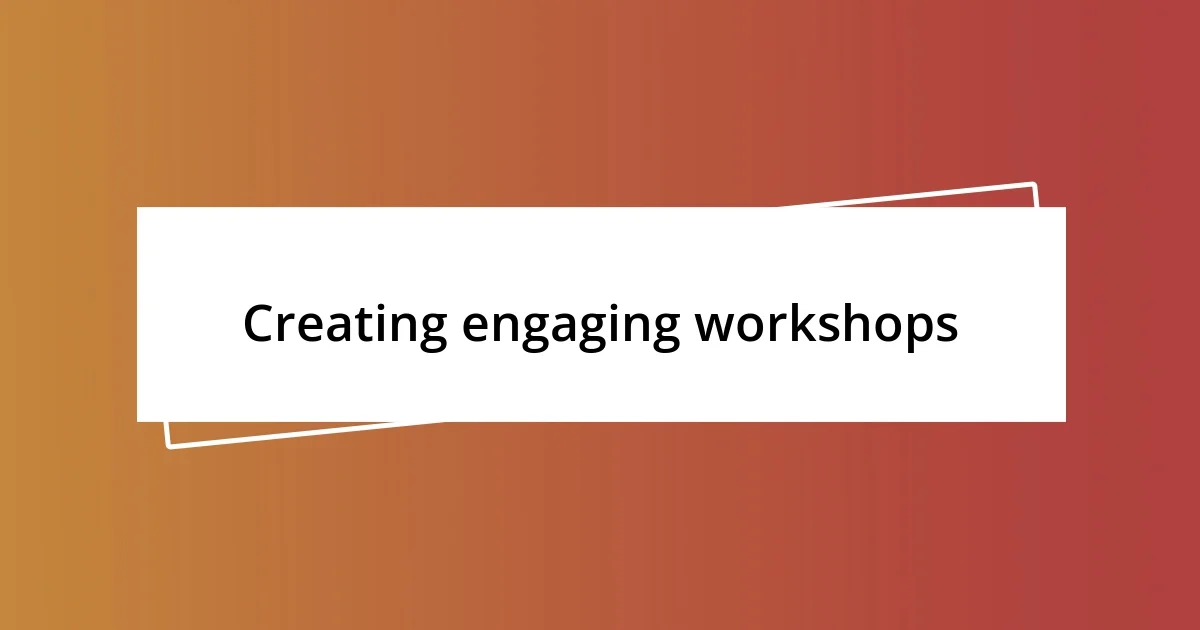
Creating engaging workshops
Creating engaging workshops starts with understanding your audience’s interests. One time, I decided to host a pottery workshop, thinking it would attract the local artsy crowd, but I was surprised by how many people from completely different walks of life showed up. It made me realize that the right context and environment can draw in participants who you might never expect, sharpening the workshop’s vibrancy.
To make workshops truly memorable, incorporating hands-on activities is key. I’ve found that theory can quickly lose participants’ interest, but hands-on tasks breathe life into the learning experience. When I ran a cooking class, we not only prepared a dish but also shared stories behind the recipes, creating an engaging atmosphere where everyone felt like they were part of something special. Have you ever sat down after a class and felt connected to others just through the act of creating something together? It’s that shared experience that keeps people coming back.
Promoting workshops doesn’t have to be daunting, but I have learned that authentic excitement can be contagious. I remember the time I shared stunning photographs of previous workshops on social media, coupled with participants’ glowing testimonials. The response was tremendous! It became clear to me that showcasing genuine experiences was far more compelling than just listing facts. How do you share your passion—through words, visuals, or the stories of those you’ve influenced? There’s a world of possibilities in how we can present our skills while inviting others in.
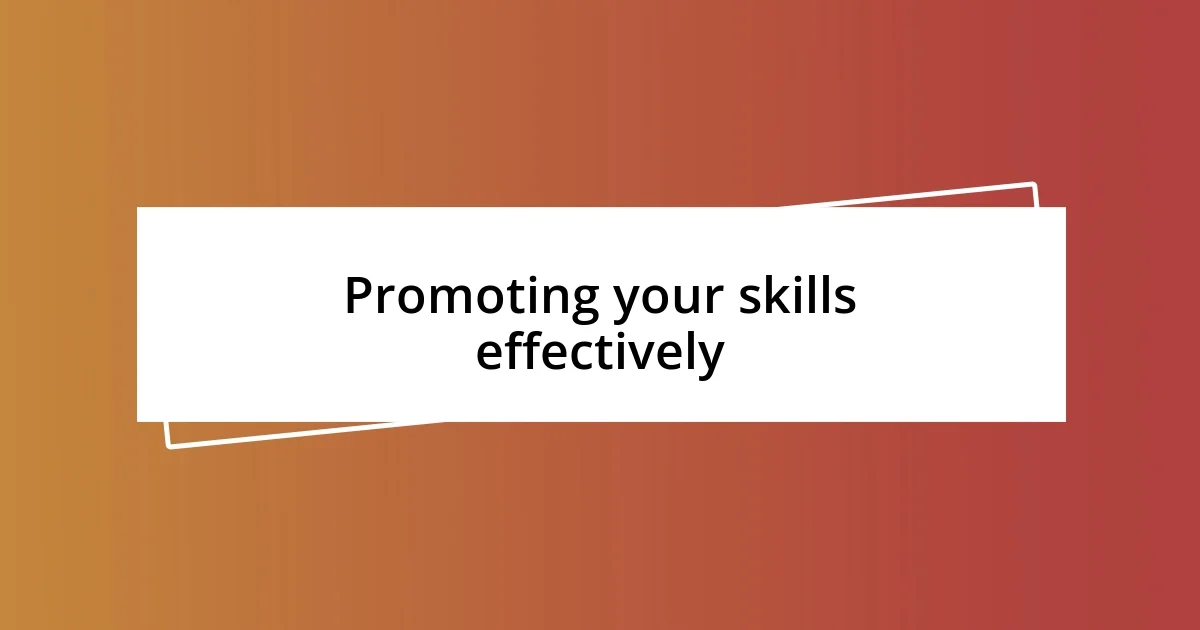
Promoting your skills effectively
Promoting your skills effectively hinges on authenticity. Recently, I decided to create a short video showcasing my knitting workshop. I spoke candidly about my passion for knitting, my journey, and even some of my initial struggles. The warmth that radiated from my story resonated with viewers, and several signed up right after. Isn’t it fascinating how sharing our genuine selves can engage others so much more powerfully than generic promotions?
Another approach that has proven successful for me is leveraging local partnerships. I collaborated with a nearby art supply store to host a painting night. They promoted the event in their newsletter while I provided the creative expertise. The synergy not only expanded my audience but also fostered a community vibe. Have you thought about the businesses or individuals in your area that share a similar mission? Working together can create a win-win situation.
Don’t underestimate the power of word-of-mouth. I once had a former student spread the word about my online pottery classes to her family and friends. It was heartwarming to see how one enthusiastic advocate could lead to a surge of registrations. I truly believe that personal stories shared among circles can ignite interest far beyond what conventional advertising can achieve. Have you considered how your current participants can become your biggest supporters simply by sharing their experiences?
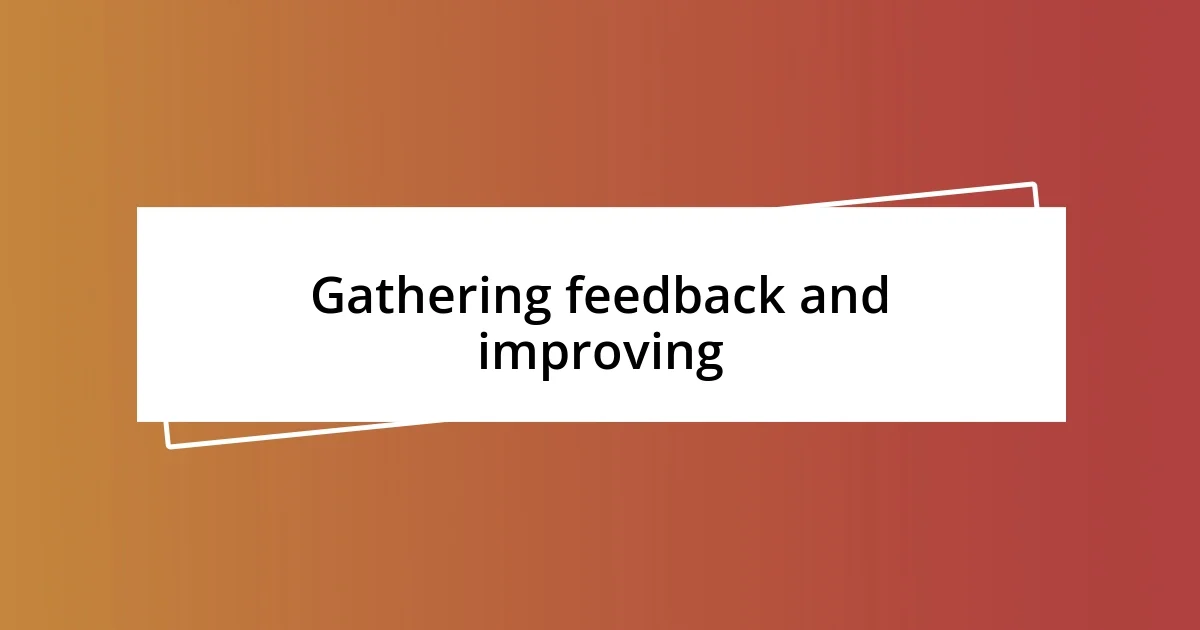
Gathering feedback and improving
Gathering feedback is an essential part of improving any skill-sharing initiative. After each workshop, I make it a point to ask participants for their thoughts. One time, I received a simple but powerful piece of feedback: a participant suggested adding more group discussions. This insight led to a significant change in my approach, and I could see how much more engaged everyone became in subsequent sessions. Have you ever felt the difference when someone’s suggestion was taken to heart?
I also like to create anonymous surveys after my events because they often yield surprisingly candid responses. I remember a survey where someone noted they struggled with the pace of the class. Adjusting my teaching style didn’t just help that individual; I noticed an overall increase in participant satisfaction. It’s incredible how small tweaks can lead to a more fruitful experience for everyone. How do you gather honest feedback from your learners?
Additionally, I find it invaluable to follow up with participants a few weeks after a class. I once reached out to past attendees of a writing workshop, and many shared how they continued to develop their skills. Hearing their stories not only warmed my heart but also provided me insights into what lasting impacts my workshops had. This ongoing dialogue really enriches my connection with the community. Have you ever checked in with past participants to see how they’re applying what they’ve learned?
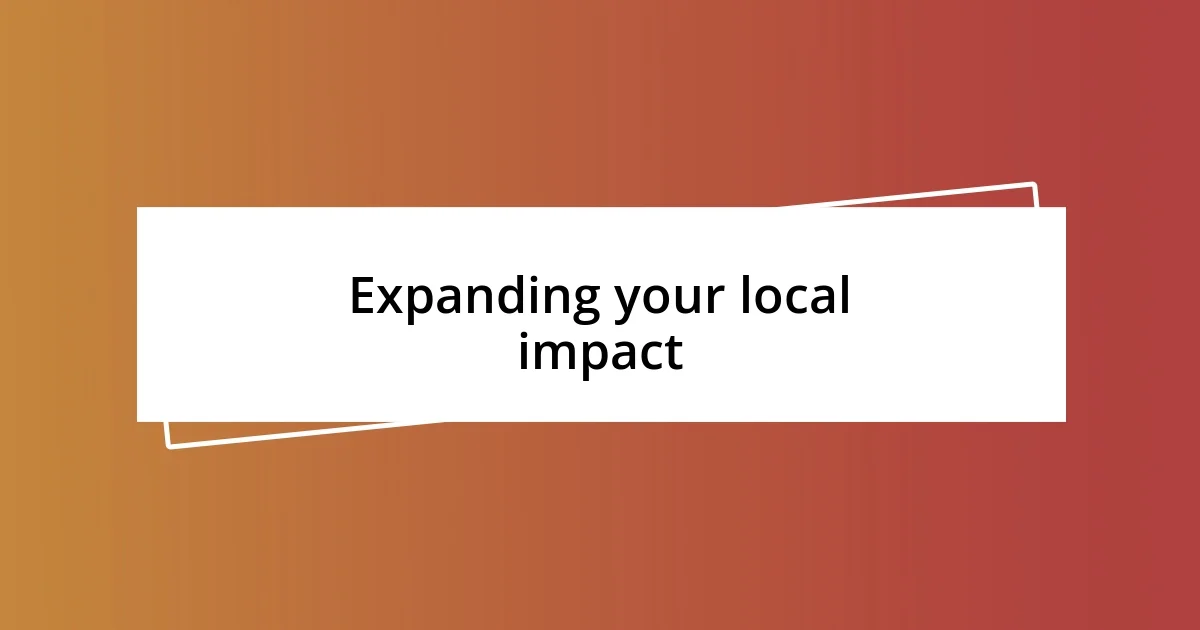
Expanding your local impact
Expanding your impact locally often means getting involved with community events. I remember volunteering to lead a creative workshop at a local fair. The thrill of connecting with people who were eager to learn and share their own talents was invigorating. That single experience opened doors to collaborations and friendships I hadn’t anticipated. How often do we overlook community gatherings as opportunities to share our skills?
Another effective method is to offer free or low-cost introductory classes. A few years back, I hosted a “try before you buy” session for my photography workshops. The response was overwhelming! Participants enjoyed a relaxed atmosphere, and many later enrolled in my full courses. It’s fascinating how providing a taste of what you offer can lead to deeper connections and growth. Have you considered the potential behind offering those initial experiences?
Social media also serves as a powerful tool for local impact. When I started sharing local success stories related to my classes, it created a ripple effect. People began to engage, comment, and share their own experiences, which not only broadened my reach but also enriched our local community narrative. Isn’t it extraordinary how, through sharing simple victories, you can inspire others to join your journey?
